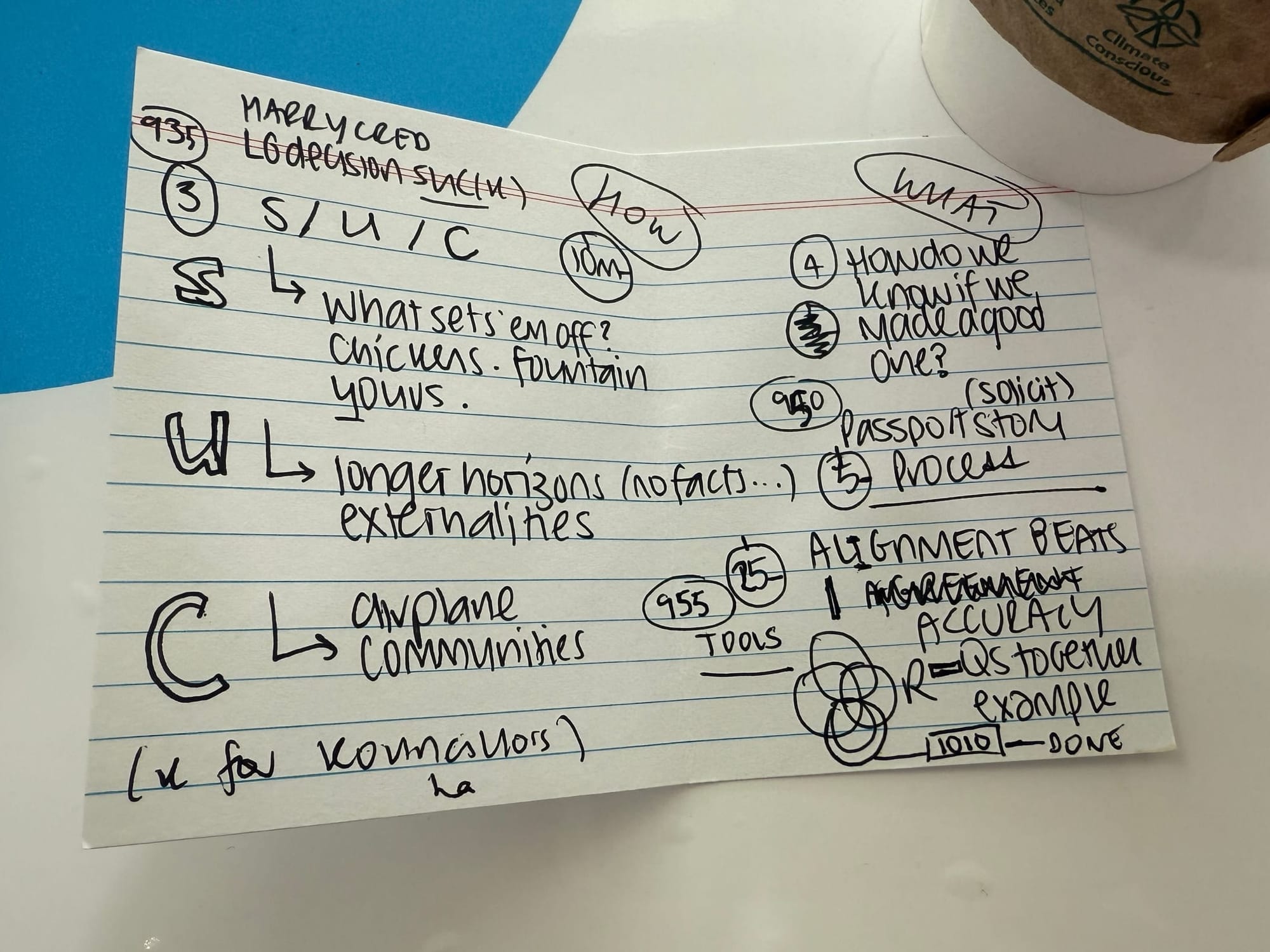My daughter got out of bed with a nightmare on Monday night, and snuggled into me on the couch. I was writing my notes for the workshop I was running the following morning at the ICMA conference in Tampa, Florida.
The session was about strategic, political decision-making - and why these kind of decisions are so tricky.
My notes were strewn on the couch, where I was working out how to structure the session. I had the three characteristics of a strategic decision scribbled down on an index card, which Harriet picked up and promptly snorted at.
"Mum! Are you saying “suck” in your talk?”
I looked at where she was pointing - and we both had a giggle. It was here the “Strategic decisions suc(k)” talk* was born.

Your skills won't save you here
You're probably pretty good at making decisions. You make 17,000 of them a day. If you're a professional of any stripe, you've likely been making important decisions, based on evidence and analysis, for your entire career. You know how to scope a problem, identify solutions, consider risks, set criteria, and evaluate options. You may even, like me, have gone full decision nerd and studied things like decision science, investment logic, economic analysis, CBAs and business cases.
... and if you're in an environment that makes strategic or political decisions, you probably remember the first time none of this helped you, and the outcome went in a completely unexpected direction.
Strategic decisions SUC
Strategic and political decisions are different to other decisions you make. Your skills will not help you here. There's heaps of reasons for that, many of which are contextually specific, but there are three key things that make strategic decisions SUC(k): subjectivity, uncertainty, and complexity.
- Subjectivity is about value judgements. In these decisions there is no 'right' answer because there are too many other factors at play: emotions, history, ideology, culture, politics, beliefs, and so on.
- Uncertainty is about, as Carl Spetzler so wisely noted, the lack of facts from the future. Long time horizons and vulnerability to external conditions create huge uncertainty. We don't know when the next pandemic or recession will hit, and there are too many factors out of our control to accurately predict outcomes.
- Complexity is about interconnected relationships and unpredictable consequences. This is different from something being complicated - which many decisions are. Complicated decisions have lots of moving parts, but they interact fairly predictably. With complex decisions, you pull one lever, and you have no idea what else might end up shifting as a result. A community is a complex system.
Process beats outcome
Grappling with these forces asks for different skills. In subjective, uncertain and complex environments, you don't control the outcome. To make a good decision, the only thing in your control is the process - which means you can't measure the quality of your choices by how they turn out, but by the way you got there.
A full, fair and focused decision process will do a lot of things well, but the most important is taking the right people on the journey.
Alignment beats accuracy
When accuracy doesn't exist, you will need to put alignment first. Strategic and political decisions are a collaborative exercise - especially in the public sector, where this is legally required - made in consultative and multi-stakeholder environments. No one person will ever be thrilled by the decision you make (and if they are, you might want to take another look.)
When you make decisions with others, you'll have to choose the one you can live with. Where you can sleep at night. Where other people are enthusiastic enough to stay committed, even if it isn't the perfect solution. This engagement and support will be critical when - not if - things turn to custard in an unexpected way and you need to change course.
Which means ultimately, at the end of all this clever analysis, the message is pretty simple: the right decision is one you can all live with, and stick to.
Til next week,
AM
* Like any good ideas person protecting her IP, Harriet wants to ensure she receives attribution. Hopefully this opening Wednesday Wisdom story counts. Plus, she got a robust round of applause in yesterday's workshop!
For more on how to make good strategic and political decisions, pick up a copy of From Strategy to Action (for strategic planning processes) You Don't Need An MBA (for leadership skills) or Local Legends (for local government decisions).










